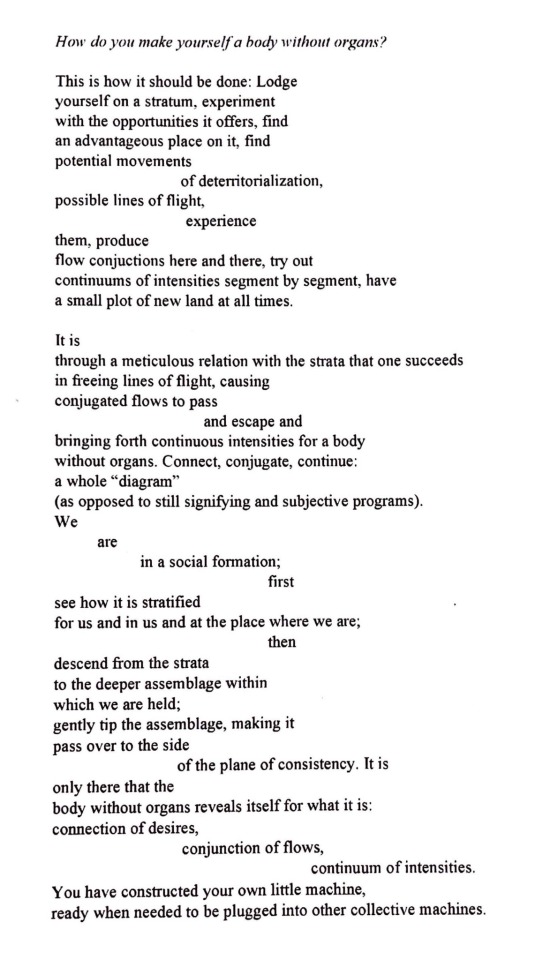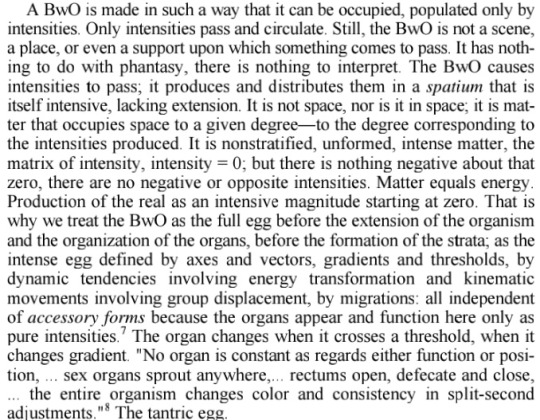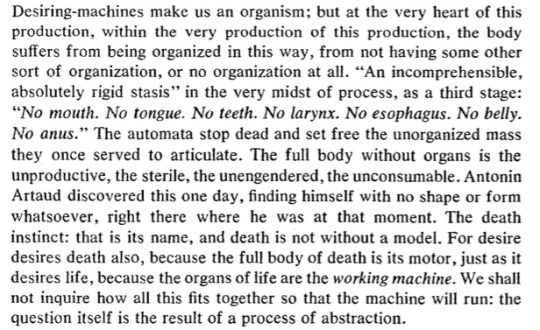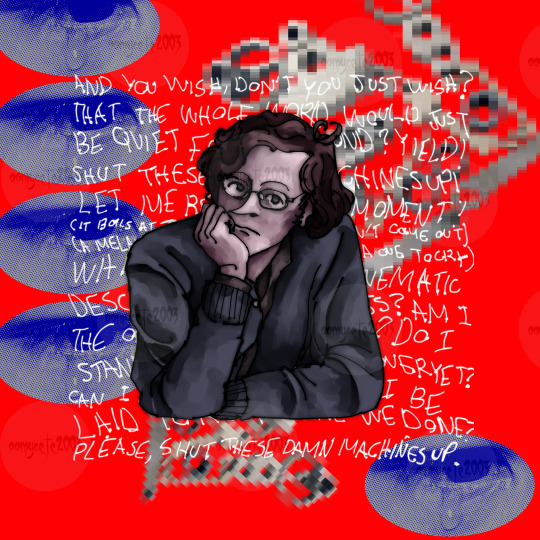#capitalism and Schizophrenia
Text

#deleuze#guattari#psychoanalysis#schizoanalysis#anti oedipus#deleuze and guattari#garfield#shitpost#capitalism and schizophrenia#philosophy
66 notes
·
View notes
Text

today in the library i turned a deleuze and guattari paragraph into a poem
#a thousand plateaus#deleuze#guattari#deleuze and guattari#deleuze & guattari#body without organs#bwo#philosophy#poetry#d&g#capitalism and schizophrenia
13 notes
·
View notes
Text

Gilles Deleuze & Felix Guatarri, A Thousand Plateaus (1980), How Do You Make Yourself A Body Without Organs?
#philosophy#mysticism#gilles deleuze#felix guattari#a thousand plateaus#capitalism and schizophrenia#body without organs#schizoanalysis
14 notes
·
View notes
Text

Deleuze & Guattari: Anti-Oedipus
#what i've been saying ‼#gilles deleuze#félix guattari#deleuze and guattari#capitalism and schizophrenia#anti-oedipus
3 notes
·
View notes
Text


a heart that's full up like a landfill
#euker art#felix guattari#guattari#schizoanalysis#anti oedipus#a thousand plateaus#vent art#sort of. i was in the trenches making this.#art#capitalism and schizophrenia
15 notes
·
View notes
Quote
Delirium is the general matrix of every unconscious social investment. Every unconscious investment mobilizes a delirious interplay of disinvestments, of counterinvestments, of overinvestments. But we have seen in this context that there were two major types of social investment, segregative and nomadic, just as there were two poles of delirium: first, a paranoiac fascisizing (fascisanf) type or pole that invests the formation of central sovereignty; overinvests it by making it the final eternal cause for all the other social forms of history; counterinvests the enclaves or the periphery; and disinvests every free “figure” of desire—yes, I am your kind, and I belong to the superior race and class. And second, a schizorevolutionary type or pole that follows the lines of escape of desire; breaches the wall and causes flows to move; assembles its machines and its groups-in-fusion in the enclaves or at the periphery—proceeding in an inverse fashion from that of the other pole: I am not your kind, I belong eternally to the inferior race, I am a beast, a black. Good people say that we must not flee, that to escape is not good, that it isn’t effective, and that one must work for reforms. But the revolutionary knows that escape is revolutionary—withdrawal, freaks—provided one sweeps away the social cover on leaving, or causes a piece of the system to get lost in the shuffle. What matters is to break through the wall, even if one has to become black like John Brown. George Jackson. ‘I may take flight, but all the while I am fleeing, I will be looking for a weapon!’
Gilles Deleuze & Felix Guattari, Anti-Oedipus: Capitalism and Schizophrenia (Trans. Robert Hurley, Mark Seem, and Helen R. Lane)
63 notes
·
View notes
Text
A schizophrenic out for a walk is a better model than a neurotic lying on the analyst's couch. A breath of fresh air, a relationship with the outside world. Lenz's stroll, for example, as reconstructed by Buchner. This walk outdoors is different from the moments when Lenz finds himself closeted with his pastor, who forces him to situate himself socially, in relationship to the God of established religion, in relationship to his father, to his mother. While taking a stroll outdoors, on the other hand, he is in the mountains, amid falling snowflakes, with other gods or without any gods at all, without a family, without a father or a mother, with nature. "What does my father want? Can he offer me more than that? Impossible. Leave me in peace." Everything is a machine. Celestial machines, the stars or rainbows in the sky, alpine machines- all of them connected to those of his body. The continual whirr of machines. "He thought that it must be a feeling of endless bliss to be in contact with the profound life of every form, to have a soul for rocks, metals, water, and plants, to take into himself, as in a dream, every element of nature, like flowers that breathe with the waxing and waning of the moon. To be a chlorophyll- or a photosynthesis-machine, or at least slip his body into such machines as one part among the others. Lenz has projected himself back to a time before the man-nature dichotomy, before all the co-ordinates based on this fundamental dichotomy have been laid down. He does not live nature as nature, but as a process of production. There is no such thing as either man or nature now, only a process that produces the one within the other and couples the machines together. Producing-machines, desiring-machines everywhere, schizophrenic machines, all of species life: the self and the non-self, outside and inside, no longer have any meaning whatsoever.
Gille Deleuze and Felix Guattari, Anti-Oedipus: Capitalism and Schizophrenia
3 notes
·
View notes
Text
ever since i read that moskowitz essay on the buzzfeedication of mental health (link here) it has lived rent free in my head. the image of jonah peretti writing earnestly about the dangers in commodification of identity in late capitalism before going on to co-found buzzfeed is irresistable. i finally read the original piece and damn it is a really succinct analysis of how identity formation is being tied to late capitalism. just read this:
"What is noticeable is not the content of the images but the efficiency and rapidity with which they are circulated and consumed. Nevertheless, to promote consumer capitalism the images must have some content to create the possibility for a mirror stage identification. It is this identification with a model, athlete, or actor that encourages the purchase of the product being pitched. In order for an advertisement in GQ to be successful, it must provoke an ego formation that makes the product integral to the viewer's identity. This fragile ego formation must persist long enough for the GQ reader to purchase the product."
and
"This dual relation proves essential to the workings of consumer capitalism. It allows an individual to identify with an advertisement (re-translation), and project an identity into the future that requires the purchase of a product. Simultaneously, other advertisements will bombard the viewer, "splitting up signifying sequences (de-translation)," and creating the possibility for fresh identity formations (re-translation).
In Lacanian terms, consumer capitalism needs subjects who continually reenact the infantile drama of mirror stage identifications. These subjects must oscillate quickly between schizophrenic consciousness and idealized ego formations. Laplanche's concept of translation adds a temporal dimension to this analysis, showing how the rhythm defined by the capitalist media continually renews the process of identity formation and dissolution. Laplanche's work leads me to a conclusion that Laplanche never drew himself. I assert that the increasingly rapid rate at which images are distributed and consumed in late capitalism necessitates a corresponding increase in the rate that individuals assume and shed identities. Because advertisements link identity with the need to purchase products, the acceleration of visual culture promotes the hyper-consumption associated with late capitalism."
what a read!
#capitalism and schizophrenia#identity politics#philosophy#deleuze and guattari#judith butler#jacques lacan#identity#jonah peretti#buzzfeed#moskowitz#reading#capitalism
0 notes
Text
idk who needs to hear this but the necessary time you spent and things did while recovering from varying delusions, in order to be a functional person, is time not wasted <3
#delusion recovery#severe depression#psychotic depression with anxious distress#depression with psychotic features#you are not low functioning you're suffering from something severe#guilt delusions#delusions of persecution#bipolar depression#schizoaffective disorder#schizophrenia#bpd psychosis#bpd paranoia#major depressive disorder#bipolar disorder#bipolar 1#bipolar mania#anti capitalism#anti oppression
24 notes
·
View notes
Text
Why does the child die, or the bird fall as though pierced by an arrow? Because of the “danger” inherent in any line that escapes, in any line of flight or creative deterritorialization: the danger of veering toward destruction, toward abolition. [...] Music has a thirst for destruction, every kind of destruction, extinction, breakage, dislocation. Is that not its potential “fascism”? (A Thousand Plateaus, 1980, trans. B. Massumi, 1987, p. 299)
#A Thousand Plateaus#deleuze#Félix Guattari and Gilles Deleuze#guattari#deleuze & guattari#mille plateaux#A Thousand Plateaus: Capitalism and Schizophrenia
9 notes
·
View notes
Text
The fundamental problem of political philosophy is still precisely the one that Spinoza saw so clearly (and that Wilhelm Reich rediscovered): Why do men fight for their servitude as stubbornly as though it were their salvation?
Gilles Deleuze, Anti-Oedipus: Capitalism and Schizophrenia
45 notes
·
View notes
Text

Deleuze & Guattari, Capitalism and Schizophrenia: Anti-Oedipus
0 notes
Quote
[S]chizophrenia is not the identity of capitalism, but on the contrary its difference, its divergence, and its death.
Gilles Deleuze & Felix Guattari, Anti-Oedipus: Capitalism and Schizophrenia (Trans. Robert Hurley, Mark Seem, and Helen R. Lane)
56 notes
·
View notes
Text
“A therapist told me in my midtwenties, when my diagnosis was still bipolar disorder, that I was her only client who could hold down a full-time job. Among psychiatric researchers, having a job is considered one of the major characteristics of being a high-functioning person. Most recently, Saks has spearheaded one of the largest extant studies about the nature of high-functioning schizophrenia. In it, employment remains the primary marker of someone who is high-functioning, as having a job is the most reliable sign that you can pass in the world as normal. Most critically, a capitalist society values productivity in its citizens above all else, and those with severe mental illness are much less likely to be productive in ways considered valuable: by adding to the cycle of production and profit. Our society demands what Chinese poet Chuang Tzu (370–287 BCE) describes in his poem “Active Life”:
Produce! Get results! Make money! Make friends! Make changes!
Or you will die of despair.”
— Esmé Weijun Wang, The Collected Schizophrenias
3 notes
·
View notes
Text
Reading lots and lots of studies is crazy because you start to realize that. Yeah. Ioanndis (2005) was so right about everything.
If you haven't read the paper, if you read a lot of research or if you do research or if you want to do research, you should. I don't fully understand a lot of the statistics at play within in, but Ioanndis basically shows that research is more likely to be false than it is to be true.
This is due to a lot of factors from sample sizes to effect sizes to researcher bias, but it all boils down to "we need to be doing research more effectively" and things... haven't changed in the past 18 years.
I've been reading a lot of meta analyses dealing with the neurolinguistics of Formal Thought Disorder and over and over again you see that every study contradicts every other study. We have lots and lots of findings, but very very few replicated ones and ever fewer ones that aren't contradicted.
I dunno I just wish that research was well funded, I guess. That maybe for once we could get a neurolinguistics paper that had a sample size of more than 25. Or that more linguists were working on them so that the linguistic stimuli were more well thought out.
Why the fuck is so much money going to... I dunno... the financial sector when it could be going to research? When it could be going to actually increasing the world's knowledge?
#schizophrenia#research#statistics#capitalism#academia#neuroscience#neurolinguistics#formal thought disorder#linguistics
3 notes
·
View notes
Text
The other day in therapy we somehow got to the subject of phones and social media it had something to do with the mindfulness section we were on and she started to go on that classic rant of how everything on social media is so fake and we compare ourselves to people who in reality use all these filters to look like that and I nodded but really I have never once been able to relate to that because I don’t use Instagram to follow hot people or influencers you know who I do compare myself to though. My mutuals on here who read Foucault for fun and understand all of it
2 notes
·
View notes